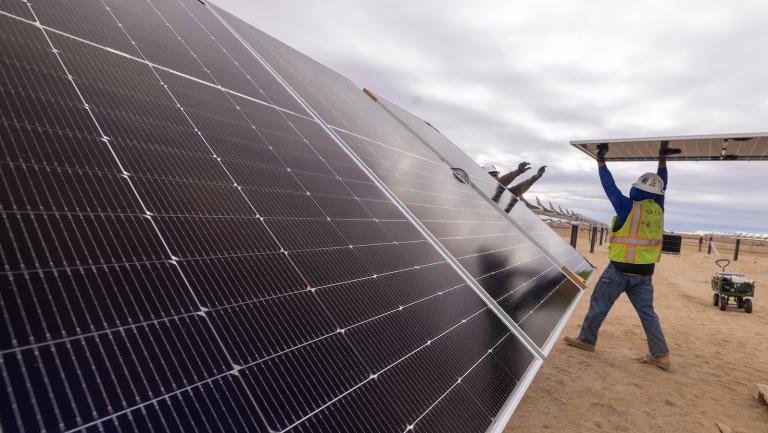I argued the other day (and Chris Mooney argued here) that we’d be better off waiting until 2009 to push for climate legislation, since anything likely to be passed this year will be fatally weakened and the political terrain is likely to be much friendlier next year.
I do not, however, want to give the impression that I think we’re going to emerge from a dark tunnel into a field of ponies next year. Things will be marginally more propitious, but only marginally — large, structural impediments to a good climate bill will remain.
So, with that in mind, here’s a list of Things That A) Will Make Getting Decent Climate Legislation Difficult and B) Won’t Change Between 2008 and 2009.
Regional politics
As a number of people have pointed out, the politics of climate/energy is as much regional as it is partisan. Some states are more reliant on dirty energy than others; some are more blessed with renewable resources than others. Anything that shifts power and money from the former to the latter will be fought by the former.
For a painful reminder, look no further than Sen. Mary Landrieu (D-La.), whose vote on the energy bill could have pushed through a version with the tax package intact. Instead, her Nay left the bill one vote short, 59-40, and she bragged on her website that she’d bucked her party in favor of Big Oil the people of Louisiana.
Or consider Reps. Rick Boucher (D-Va.) and John Dingell (D-Mich.), who in June of last year puked up an energy bill proposal that contained massive liquid coal subsidies (Virginia’s a coal state) and no increase in CAFE standards (Michigan’s a Big Auto state). Only after Pelosi took them to the woodshed did they produce something tolerable.
The fact is, regional dynamics won’t change any time soon. Coal state legislators will fight to avoid caps, or failing that, insure that Big Coal receives free pollution permit allocations, or failing that, insure that Big Coal receives huge subsidies. Farm states will push for preferential treatment for agrofuels. Auto states will fight against fuel efficiency standards. Etc. It’s going to be an extremely difficult job to enforce party unity in these circumstances.
Looming recession
The consensus seems to be that the country is heading into a recession — possibly a long and difficult recession. That’s going to produce anxiety and fear, which are not conducive to optimism and shared sacrifice.
Economic pain will make legislators extremely leery of passing ambitious legislation that might have deleterious short-term economic effects on their constituents. The very notion of carbon restrictions will be under concerted attack from Republicans and coal front groups, which will be spending millions to convince people that carbon legislation will put them out on the street.
If carbon legislation continues to be cast as an economic hit to the working class, it will be made doubly difficult by recession.
Priorities: First 100 Days
The next president is going to have a lot on his/her plate. Aside from the economic woes previously mentioned, there’s a war on. A Dem will want to get out, which is, to put it mildly, a delicate operation. A Republican president will want to double down to pump up some phantom bit of progress.
The other top-line item for any Dem will be healthcare, and that’s going to be a titanic struggle. (Don’t miss Ezra Klein’s piece on the lessons of the ’94 healthcare debacle.) Even if everything goes well and the president doesn’t end up crushed or fatally weakened, it’s going to be a long fight. Will the president and Congress be able to pursue major climate legislation at the same time?
This is all excluding the possibility of disasters, terrorist attacks, coups or spreading violence in the Middle East, or any other unforeseen circumstance. Things are going to have to line up just right for climate to get a place at the top of the list.
Obstructionism
Even the most optimistic scenarios don’t get the Dem majority in the Senate to 60 votes, where they could overcome the threat of filibuster. Depending on how things go, I’m guessing (to pull a number out of my rear) we’ll see a majority of 55 next year. That means a unified conservative bloc can still effectively thwart any bill it doesn’t like. Sure, some deals can be cut with wavering Republican moderates, but it’s precisely some of those few remaining moderates who are on the electoral chopping block this year.
As we’ve have learned with painful clarity this year, Republicans are perfectly willing to engage in historical levels of obstructionism. I don’t see that changing next year, especially on an issue that will be easy to demagogue to their base. Such are the flaws of our Constitution, which places a multitude of choke points in the path of any legislation, leading to a bias against progressive change.
—
Anyhoo, you see my point. It’s going to be incredibly difficult to get good climate legislation passed, any time. Will it be easier next year than this year? Maybe. Probably. I think so. But only by a little.


